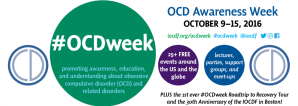OCD Awareness Week 2016
Posted by Steven J. Seay, Ph.D. in General, Obsessive-compulsive disorder (OCD), OCD, OCD - General, OCD - Treatment

It’s #OCDWEEK! Help raise awareness and understanding about obsessive compulsive disorder (OCD) and related disorders.
Welcome to #OCDWEEK 2016, a week organized by IOCDF to help raise awareness about OCD and related conditions!
If you visit IOCDF’s website, you’ll find information about local and online programs and events designed to help increase the general public’s understanding of OCD.
When I started this blog a few years ago, the internet was awash in misinformation about the nature of OCD. OCD was (more often than not) described in oversimplified terms, and the popular media largely mischaracterized OCD as a disorder defined primarily on the basis of excessive washing or checking behaviors. If you didn’t fit this mold, it was implied that you didn’t have OCD.
I was hoping that, through my writing, I might be able to address some of these misconceptions and bring awareness to some aspects of OCD and anxiety treatment that were often overlooked or poorly understood. For each person with contamination OCD or checking OCD, there was another person with Pure-O OCD wondering, “What’s wrong with me? Am I the only one who has these thoughts?”
On the surface, these various manifestations of the disorder can seem quite different, but truly, there are unifying concepts and processes that unite these disparate forms of the disorder and transcend obsessional content.
One of the marvelous things about attending an OCD support group is that you can learn so much about your own OCD by simply listening to how other people talk about theirs. Even with radically different symptoms, many people with OCD suffer the same way. They get trapped in the same types of reassurance-seeking behaviors and mental rituals. They fall into similar patterns of avoidance.
When you hear somebody else talk about their OCD — especially if it’s a different type of OCD — it can help you see your own OCD with fresh eyes, learn to take your own fears less personally, and ultimately relate to your own OCD in a different way. That’s one of the reasons why I so strongly advocate OCD support groups.
Although we have to continue to educate the “I’m so OCD” people of the world, we’ve come a long way.
There now exists a veritable army of OCD bloggers and OCDvocates, who have begun to candidly share their experiences with the disorder. They have written about what it’s like to live with the disorder, as well as their experiences in facing it through exposure and response prevention (ERP) and ACT. Their stories show that although treatment can be hard, it works.
In my role as a psychologist in Palm Beach Gardens, Florida, I am fortunate to be in a position to help people with OCD learn the tools and strategies they need to face their OCD head-on. It’s a glorious, often terrifying process, and I’m honored to serve as a guide along these journeys.
But I do find that I miss blogging. Because of that, I’ve decided to restructure my time just a bit, so that I can be more active in blogging again.
As I start to blog again, there are some topics that I know I’d like to discuss, but I’m also wondering what topics are most relevant for you. Where do you struggle most with your own treatment? What aspects of OCD most baffle you? Are there certain types of obsessive thoughts that have been inadequately addressed here or on other blogs? If so, let me know, and I can put some of these topics on my to-do list.
(FYI, the first few times you post a comment, it won’t be visible immediately, as it needs to be manually approved before it will appear on this site. In the past, due to some technological glitches, comments were being blocked from the site. I think I fixed the problem, so if you feel like joining in the conversation, please do–but also let me know if you happen to encounter any issues along the way.)
Thanks for visiting the blog and for being a part of the larger OCD community. Together, we can do great things.
OCD Awareness Week 2016 was originally published on Steven J. Seay, Ph.D.



